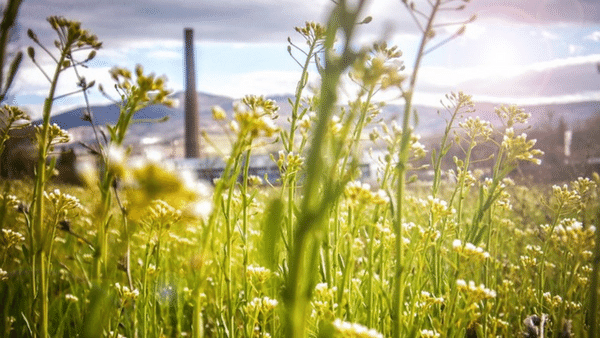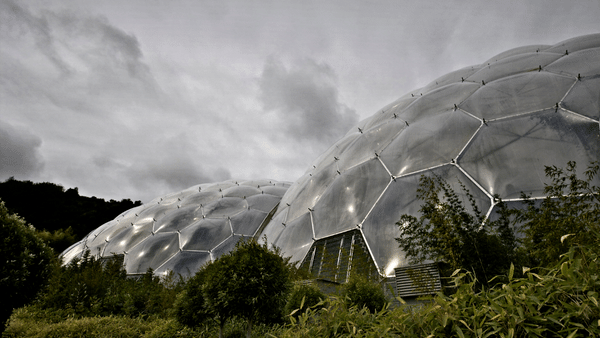In the final round-up blog following Anthropy, RSA Chief Executive Andy Haldane argues that capitalism -suitably reconfigured - has an important part to play in the flourishing of people, place and planet.
Alongside other RSA colleagues, I attended – if for only three hours - and spoke at a couple of events at the recent Anthropy conference at the Eden Project in Cornwall. Jo Choukeir has already penned an excellent blog putting our work - past, present and future - into a regenerative context, and Roberta Iley has spoken about the inspriation she took away from the event in terms of shifting from a human- to life-centric mindset. This blog explores one or two of the themes from one of my sessions at Anthropy: A 21st century Economy.
Is capitalism dead?
One of the questions I was asked during this session was: "Is capitalism dead?" This is not the first time I have been asked this question. Underlying it is a sense that the system, as currently configured, is not working as we would wish, that it is not ensuring the mass flourishing of people, place and planet.
It is easy to see people’s sense of disappointment with the 21st century. Its predecessor, the 20th century, was genuinely a century of transformation. Living standards rose more than fivefold – a rise never seen before in human history. Lifespans doubled from 40 to 80 years – again, there is no close historical precedent. Poverty fell from three-quarters to single-digit fractions of the global population. Educational standards skyrocketed everywhere.
These were the economic and societal fruits of development that most would call capitalist. Innovation and private enterprise flourished as never previously. Yet even this model needs careful definition and diagnosis. Capitalism is often misunderstood to mean unfettered free markets and private enterprise. Whule these forces were indeed important in firing innovation and enterprise and growing living standards. But they were never unfettered.
During the 19th and 20th centuries, the growing strength of the invisible hand of private enterprise was matched in equal measure by a growing state and civil society sector. For example, in the UK public spending relative to income roughly doubled in each of the 18th, 19th and 20th centuries as the provision of public goods deepened and widened. In time, that included universal state provision of education, healthcare and social insurance, among other things.
Innovation through partnership
With hindsight, it is clear that the transformation of the 20th century came courtesy of the rapid ascent of each of the private, public and civil society sectors, not only individually but from them acting in partnership. They provided innovation and insurance, in equal measures, to ensure flourishing was broadly based and inclusive. The RSA's own model of social change mimics that, combining the public, private and voluntary sectors in partnership.
If we turn to the 21st century, the contrast in fortunes could scarcely be more striking. So far, it has been a century not of transformation but stagnation. Productivity has stagnated for many businesses and pay has stagnated for many households. Levels of life expectancy and health have stagnated, or retreated, for some cohorts of society. Levels of poverty, especially among children, have risen. Educational standards have faltered for many.
This stagnation is often hitting hardest the poorest and the youngest. Those in their 20s and 30s are seeing their real pay track below earlier generations for the first time in a century. They are seeing levels of home ownership track well below not only the baby boomers but those born before the second world war. Levels of economic and financial insecurity, and accompanying mental health problems, have risen rapidly among younger people.

Age of insecurity
47 percent of young people are financially precarious, with certain groups facing even greater levels. This research investigates the stories behind these numbers.

Challenging the mental health crisis
Read the findings and recommendations of our report on the mental health benefits of a universal basic income for young people.
Let’s pluralise capitalism
This gloomy prognosis means it is unsurprising that some, as they were at Eden, are asking themselves the question: “Is capitalism dead?” My answer is that capitalism never did come in a single flavour, that is always has been an evolutionary animal. What is needed now is a different flavour of capitalism than its predecessors to secure the mass flourishing of people, place and planet. What is needed is system-shifting rather than system-scrapping,
There are many aspects of this system shift. One of them goes to the very heart of what we even mean by the 'capital' in capitalism. Capital can sometimes be seen in very narrow terms, or even singularly, as financial capital. Financial capital is important for fuelling and financing rises in innovation and living standards. But it is clear it is only one ingredient in the cake mix of mass flourishing of people, place and planet.
The other capitals essential for this task include:
- human capital (the education and skills of people)
- physical capital (from transport to broadband to computers)
- intellectual capital (ideas and technologies)
- social capital (trust and relationships)
- natural capital (our climate and biosphere).
We know from history that it is only by combining these ingredients, and ensuring none of them are missing or insufficient, that the cake will rise and with it the fortunes of people, place and planet.
At present, while there is a growing awareness of the importance of the plural set of capitals for societal success, not all of them are given the prominence they deserve - for example, social and natural capital, the new kids on the block. Rarely are they sought at a collective, or systems, level rather than individually. For example, social capital, social connectivity and social infrastructures – from high streets to green spaces to youth clubs to football clubs – are often under-emphasised relative to say, digital and physical infrastructures, such as railways and broadband.
Social capital over human capital
Raj Chetty (whose work was presented at the RSA in November) has recently demonstrated the importance of social connections and social capital in driving levels of social mobility in the United States. It is who you know (social capital) rather than what you know (human capital) that truly shapes your life course. Yet social capital and connectivity are far less focussed on, measured and nurtured when it comes to policy interventions and actions. This is something we at the RSA are seeking to remedy.
This oversight in how we value and nurture capital is even greater when it comes to natural capital. On that front, the 20th century was transformational for all the wrong reasons. During the course of it, levels of natural capital may have fallen by as much as 50% on some estimates. Having broadly sustained natural capital prior to the Industrial Revolution, the world turned sharply extractive after it.
Looking ahead, this now calls for a very different flavour of capitalism than the past if the mass flourishing of (people, place and) planet is to be secured. It means going much further than simply sustaining levels of natural capital. Rather we need to seek actively to replenish it. This is what is meant by regenerative practice – flipping capitalism from extractive to regenerative practice. It is why regenerative practice needs to be the next practice, not the best practice.
And what applies to natural capital applies equally to other of the capitals making up the capitalist cake mix. We need also to replenish human capital - our skills and capabilities - through a new 21st century learning model very different from the 20th century one - lifelong, modular, digital, personalised, and contextualised. And we need to replenish social capital by refashioning how and where people connect, debate and decide, including at the local level.
Conclusion
Capitalism is not, I suspect, dead or dying. But it may well be suffering a mid-life crisis. Our Design for Life paper published in early 2022 provided a mid-life MOT for capitalism and found grounds for concern about wealth, health and happiness. Through the accompanying Design for Life programme, the RSA is developing the 21st interventions and infrastructures necessary to replenish people, place and planet. This is a system-shifting agenda, one whose success will rely on the public, private and civil society sectors acting for the long term and in partnership. It is a completely different flavour of capitalism than any in human history.
How do you think these flavours of captialism should interplay in order to deliver flourishing and regenerative people, place and planet? What other financial and economic structures can be introduced to support this goal? Let us know your views in the comment section below.
Related content
-
Regenerative organisations: the time is now, the place is here
Blog
Joanna Choukeir
Regenerative organisations are vital to our regenerative future. The time is now for the RSA to emerge as such an institution.
-
Life-centric from human-centric: a shift in mindset
Blog
Roberta Iley
In our second Anthropy round-up blogs, Head of Regenerative Design, Roberta Iley, links the discussions she took part in at the Eden Project with our new capabilities enquiry.




Be the first to write a comment
Comments
Please login to post a comment or reply
Don't have an account? Click here to register.